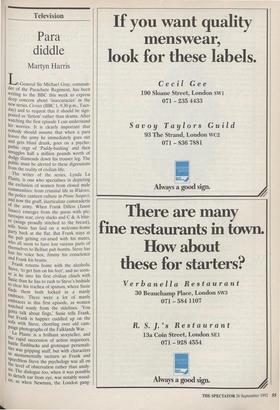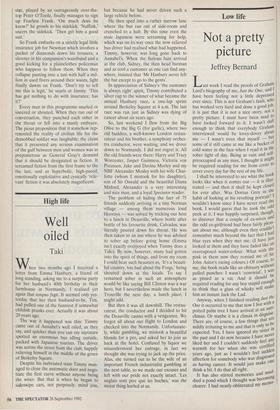Television
Para diddle
Martyn Harris
Lt-General Sir Michael Gray, comman- der of the Parachute Regiment, has been writing to the BBC this week to express deep concern about 'inaccuracies' in the new series, Civvies (BBC 1, 9.30 p.m., Tues- day) and to request that it should be sign- posted as 'fiction' rather than drama. After watching the first episode I can understand his worries. It is clearly important that nobody should assume that when a para leaves the army he immediately goes out and gets blind drunk, goes on a psycho- pathic orgy of 'Paddy-bashing' and then smuggles half a million pounds worth of dodgy diamonds down his trouser leg. The public must be alerted to these digressions from the reality of civilian life. The writer of the series, Lynda La Plante, is one who specialises in depicting the exclusion of women from closed male communities: from criminal life in Widows, the police canteen culture in Prime Suspect, and now the gruff, inarticulate camaraderie of the army. When Frank Dillon (Jason Isaacs) emerges from the paras with pic- turesque scar, civvy slacks and C & A blaz- er (wings proudly stitched to the breast), wife Susie has laid on a welcome-home party back at the flat. But Frank stays at the pub getting rat-arsed with his mates, who all seem to have lost various parts of themselves to Belfast pub bombs. Steve has lost his voice box, Jimmy his conscience and Frank his brains. Frank returns home with the alcoholic Steve, 'to get him on his feet', and no soon- er is he into his first civilian clinch with Susie than he has to rush to Steve's bedside to clear his trachea of sputum, where Susie finds them both locked in a manly embrace. There were a lot of manly embraces in this first episode, as women watched wanly from the sidelines. 'You gotta talk about fings,' Susie tells Frank, but Frank is happier cuddled up on the sofa with Steve, chortling over old cam- paign photographs of the Falklands War. La Plante is a brilliant storyteller, and .the rapid succession of action sequences, b flashbacks and grotesque personali- ties was gripping stuff, but with characters as monumentally taciturn as Frank and sPepchless Steve the psychology was all on the e level of observation rather than analy- sts. The dialogue too, when it was possible to detach ear from eye, was notably wood- en, as when Newman, the London gang-
star, played by an outrageously over-the- top Peter O'Toole, finally manages to sign up Fearless Frank. 'Ow much does he know?' he growls to his sidekick. `Nuffink,' sneers the sidekick. 'Then get him a good suit.'
So Frank embarks on a strictly legal little insurance job for Newman which involves a packet of diamonds down his trousers, a shooter in his companion's waistband and a good kicking for a plainclothes policeman who happens to follow them. When they collapse panting into a taxi with half a mil- lion in used fivers around their waists, light finally dawns on Frank. 'Don't try to tell me this is legit,' he snarls at Jimmy. 'This has got nothing to do with insurance, has it?'
Every man in this programme snarled or sneered or shouted. When they ran out of conversation, they punched each other in the throat or fell into a manly embrace. The pious proposition that it somehow rep- resented the reality of civilian life for the demobbed soldier was laughable; the claim that it presented any serious examination of the gulf between men and women was as preposterous as General Gray's demand that it should be designated as fiction. It screamed fiction from the first frame to the the last, and as hyperbolic, high-paced, emotionally exploitative and cynically 'rele- vant' fiction it was absolutely magnificent.



































































 Previous page
Previous page